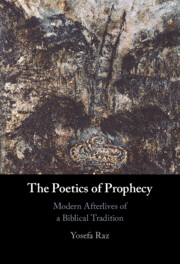Book contents
- The Poetics of Prophecy
- The Poetics of Prophecy
- Copyright page
- Dedication
- Contents
- Illustrations
- Acknowledgements
- Introduction
- Chapter 1 Seraphic Choirs and Stuttering Prophets: Symmetry, Disorder, and the Invention of the Literary Bible
- Chapter 2 Walking through William Blake’s Irregular Bible
- Chapter 3 The Myth of Primordial Orality and the Disfigured Face of Written Prophecy
- Chapter 4 Ahad Ha’am’s Mask of Moses and the Secularization of Prophetic Power
- Chapter 5 Haim Nahman Bialik: The National Poet’s Cup of Sorrows
- Afterword
- Bibliography
- Index
- Index of Biblical Quotes
Afterword
An Untuning
Published online by Cambridge University Press: 14 December 2023
- The Poetics of Prophecy
- The Poetics of Prophecy
- Copyright page
- Dedication
- Contents
- Illustrations
- Acknowledgements
- Introduction
- Chapter 1 Seraphic Choirs and Stuttering Prophets: Symmetry, Disorder, and the Invention of the Literary Bible
- Chapter 2 Walking through William Blake’s Irregular Bible
- Chapter 3 The Myth of Primordial Orality and the Disfigured Face of Written Prophecy
- Chapter 4 Ahad Ha’am’s Mask of Moses and the Secularization of Prophetic Power
- Chapter 5 Haim Nahman Bialik: The National Poet’s Cup of Sorrows
- Afterword
- Bibliography
- Index
- Index of Biblical Quotes
Summary
What does prophetic poetry look like now, in the first decades of the twenty-first century, and what could it become? The poets of this Afterword – Rob Halpern, Hezy Leskly, Anne Carson, and M. NourbeSe Philip – take up the countertradition of “weak prophecy” in various ways. They turn toward what is weak and ungainly, torn, stuttering, glitchy, and leaky, in order to “untune” (as Halpern calls it) national melodies, to reach into the “stinking, eviscerated innards” (Philip) of the language of oppression, to suggest a new way of organizing what is inside and outside, “another human essence than self” (Carson). Their prophetic untuning does not represent (only) a lack or a loss; it is not merely the expression of the poverty, violence, and suffering of the contemporary moment. By marking this poetry as “prophetic,” we can say that it means, through its very weakness, to use a dialectic gaze to actively redeem the past together with the future.
Keywords
- Type
- Chapter
- Information
- The Poetics of ProphecyModern Afterlives of a Biblical Tradition, pp. 174 - 191Publisher: Cambridge University PressPrint publication year: 2023

